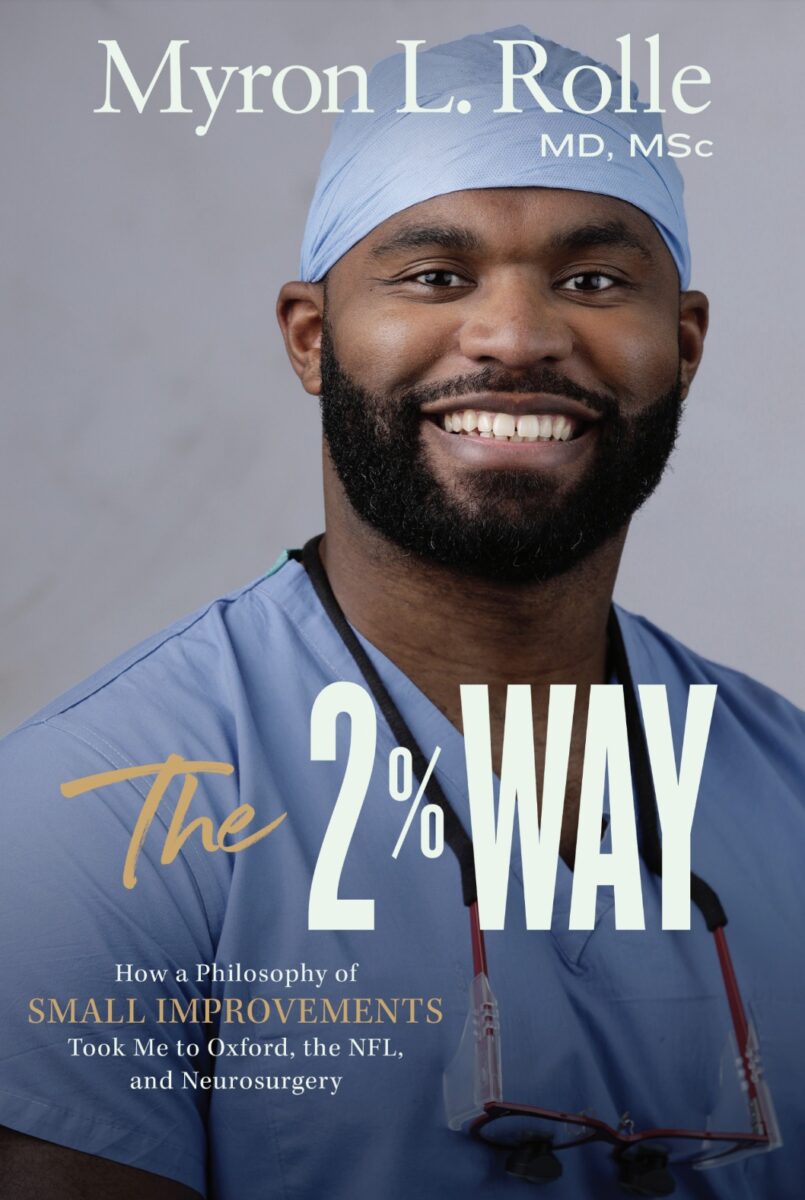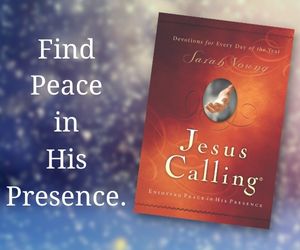Great Moments Can Happen In Seasons of Uncertainty: Dr. Myron Rolle and Inky Johnson
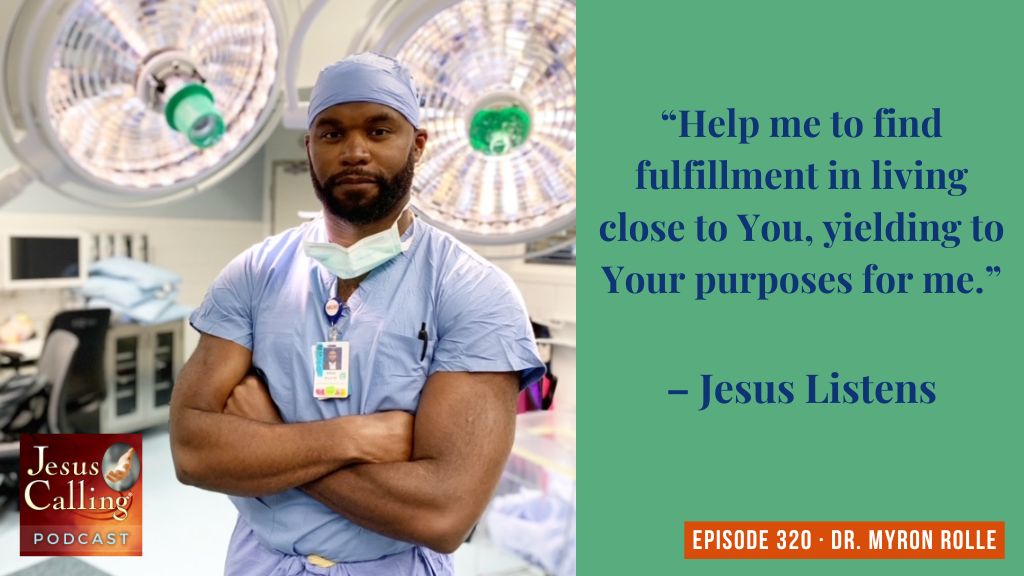
Dr. Myron Rolle: God always works it out and sort of protects you from things that you don’t know are coming down the road. So maybe that’s what He was doing. But certainly, football was something I loved. When you have these issues, these challenges, how do you move from these challenges at a slow pace, but going forward every single day to try to make sure that you know your purpose, you know you’re walking towards who you ought to be, and that you’re never shaken from that?
Great Moments Can Happen In Seasons of Uncertainty: Dr. Myron Rolle and Inky Johnson – Episode #320
Narrator: Welcome to the Jesus Calling Podcast. What comes to mind when you hear the word “catalyst”? A short cut? A dynamic experience? A transformative idea? The ancient roots of this word comes from a verb that means to unloose, to set free. Think of a horse hemmed in a barn stall. A catalyst would be an open door.
This week, both of our guests had dreams involving football. Both, however, had other gifts and talents they would see come to the fore, and realized that the disappointing situations and tough choices that happened to them while on the way to their dreams were catalysts for broader horizons with bigger pastures.
Dr. Myron Rolle is a neurosurgeon who has traveled the world, making it a better place using primarily his gifts, as he puts it, “from the neck up.” By choosing a path toward medicine, Myron’s football dreams were cut short, but was able to see the wisdom in having his dream diverted. Inquiros “Inky” Johnson nearly died while playing football, but the spiritual mentoring he received during his years at the University of Tennessee set him on course to be a motivational speaker who uses his platform to travel the world and make it a better place, too.
Let’s hear Myron’s story first.
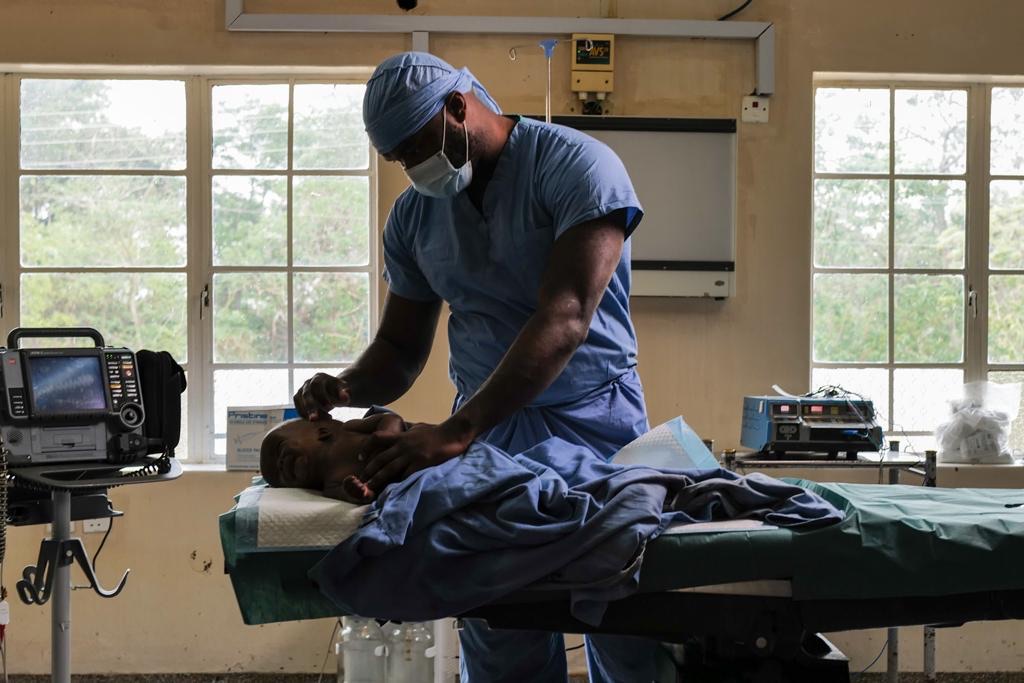
Dr. Myron Rolle: My name is Dr. Myron Rolle. I am a senior neurosurgery resident and global neurosurgery fellow at Harvard Massachusetts General Hospital. I’m also a Rhodes Scholar, a former NFL player, and chairman of the Caribbean Neurosurgery Foundation. I’m the author of The 2% Way, a book that chronicles my life story and talks about a mindset that helps you make small improvements daily towards your larger goal.
My story starts in the Bahamas. My parents met when they were eight years old, dated at fifteen, married at twenty-one. They’ve been married for fifty-one years now. They had my four older brothers in the Bahamas.
Mummy was eight months pregnant with me in Nassau, but wanted me to be an American and a Bahamian citizen. So she got permission from her OB-GYN to fly to America, where she had a few friends. She had me in Houston, Texas, and then she flew back to the Bahamas. I grew up in the Bahamas for the first three years of my life, and then eventually my parents always wanted to get to America. That was their mindset, their vision for us. They often referenced Proverbs 29: “Where there is no vision, people will perish.” They always talked about getting to America as a big dream, big goal.
We were leaving behind all of the comfort of the Bahamas and starting over in America, where the majority of people around us didn’t share our culture. And so in order for us, I think, to truly have success, they injected into our minds that this was important. This opportunity was not one for us to become complacent. We had to stick together. We had to lean on each other, to lean on our relationship with Christ. And if we did that, then maybe success would follow.
“We had to stick together. We had to lean on each other, to lean on our relationship with Christ. And if we did that, then maybe success would follow.” – Dr. Myron Rolle
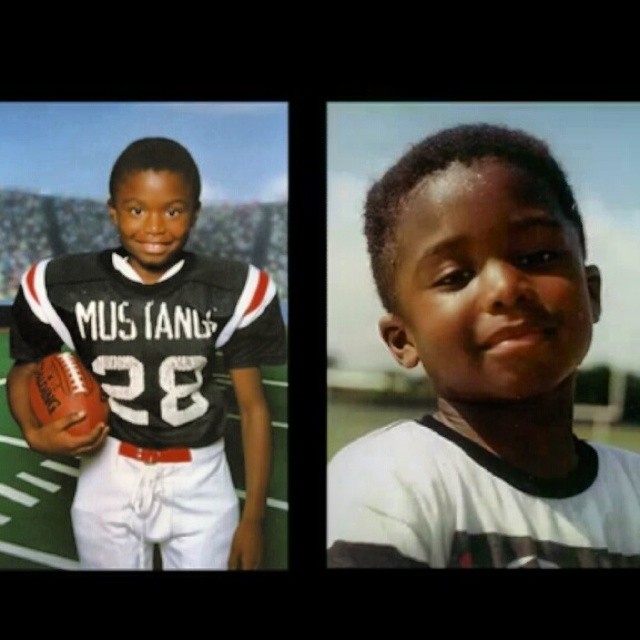
From an early age, sports were a big part of our house, and it also made for a very competitive household growing up. All the brothers were fighting or jockeying for position or trying to race each other, see who was the fastest, who was the strongest, who could jump the highest. Every day was something else that we were doing to try to outdo the other.
My parents made it such a distinct priority for us to be good students before anything else. If you want to compete as a football player, basketball player, track runner, baseball player, you had to do well in school, get good grades, and join two or three clubs. I truly enjoyed writing for our newspaper, and being student body president, and playing the baritone saxophone for our local nursing home in Atlantic City, going to different states and building homes for Habitat for Humanity, and then volunteering at my church.
Then, when I became very good at football and my parents realized I was head and shoulders above my competition, then they were like, Okay, this young man’s got a chance of maybe playing professionally.
The Influence of a Godly Coach
I think the most important part of high school that launched me into college was going over to Princeton University and seeing this big statue and trophy display of Senator Bill Bradley. This guy was remarkable. I mean, he was a Rhodes Scholar. He was the best player in college basketball when he played, he played for the New York Knicks. He’s a senator now, like, this guy is ridiculous. I went and Googled him. I wanted to learn more about him. And then the Rhodes scholarship kept popping up. And I said, “Well, maybe if I want to be a true student athlete and balance what I’ve been doing my entire life on a larger level, maybe a Rhodes Scholarship like Senator Bradley accomplished, maybe that’s the next move for me.”
So when I got recruited by the eighty-three different colleges—Division I schools—as a number-one rated player in America, I told every coach and all the director of football operations, “I want to be a Rhodes Scholar. How can you help me get there?”
And so getting to FSU and choosing that school, I was committed to their promise that they would do just that: that I’d be a student first, athlete second, that they would handle everything on the football field. They had an acumen of putting players into the National Football League, but they would also help grow me as a leader, as a Christian, as a man, and eventually as a role model so that I can be in a good position to apply and eventually win the Rhodes Scholarship.
“I’d be a student first, athlete second, [but FSU promised] to grow me as a leader, as a Christian, as a man, and eventually as a role model.” – Dr. Myron Rolle
My head football coach was named Bobby Bowden, a huge Christian man. My first meeting with him, we spent thirty minutes talking Scripture and talking about Christ instead of talking about Xs and Os and cover two, cover three blitz packages. He didn’t really want to talk about football in the beginning. And my parents trusted that not only would he take care of me as a football player, but more so as a man. He was like a grandfather figure. And coming from New Jersey, they said, “We can deposit our son into your hands and feel comfortable for the next three or four years that you will do right by him.”
One thing that Coach Bowden said in that first meeting was that he was excited about his players getting into the NFL. There’s no question, he would love to see his players walk across the stage in New York City, get their names called to be drafted into a National Football League team. But he’d be more proud and more pressed to see all of his players’ names written in the Lamb’s Book of Life [Luke 10:20] and join him in heaven one day.
And so for me, no coach said that to me during the process. It really hit me to the core. And from that day forward, Florida State was absolutely invested in me being a true scholar athlete. I got to shadow neurosurgeons in Tallahassee, Florida. I started my own foundation. I got to work with the Seminole Tribe of Florida. I got to do human mesenchymal stem cell research during practice time. And Coach gave me some opportunities to miss thirty minutes of the beginning of practice so I could do research with my human biochemistry professor. I got to study abroad [at Oxford University]. No football player was studying abroad, but he allowed me to go, stay in shape, and come back and rejoin the team. He was just a phenomenal man who was committed to that promise from the beginning.
“One thing that Coach Bowden said was that he was excited about his players getting into the NFL . . . But he’d be more proud and more pressed to see his players’ names written in the Lamb’s Book of Life. ” – Dr. Myron Rolle
Trading the Football Field for the Medical Field
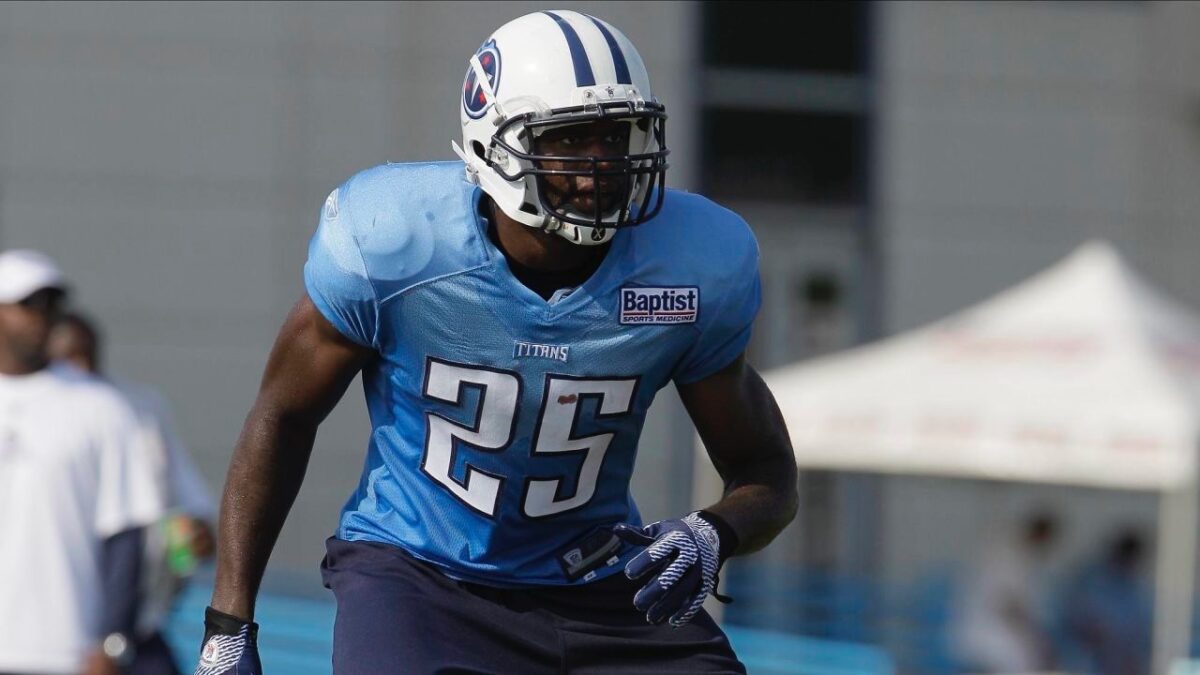
Getting into the NFL and playing in the NFL was one of the more stressful moments of my life. I think I disappointed people and failed at it in the sense that I didn’t play very long. I wasn’t a star.
When I played football from the beginning, literally, as soon as I stepped my cleats onto a field at six years old, I was taller, faster, stronger, more talented than my competition. And I was always—at every level—either the best or near the best, from Pop Warner to high school to college. And then I decided to take a year and a half off to go study at Oxford, get my master’s degree in medical anthropology, immerse myself in a new culture, meet new friends, develop my intellectual capital, do all the things that Rhodes scholars do and step away from football.
I was projected to be a first-round pick if I came out in 2009 instead of going to Oxford as a Rhodes Scholar. Many people were saying, “You are showing that you’re not committed to football, you’re abandoning your team. You don’t think it’s serious enough. If anyone else had a chance to be a first round draft pick in the NFL, they would go. But you’re telling us that this is not that serious to you. And if you come back, why should we invest money or a draft pick into you? Because if something happens, maybe you just run through a rough patch in the NFL, you pick up and leave, and then we have to scramble to find somebody to replace you. So we don’t want to invest a lot in you.”
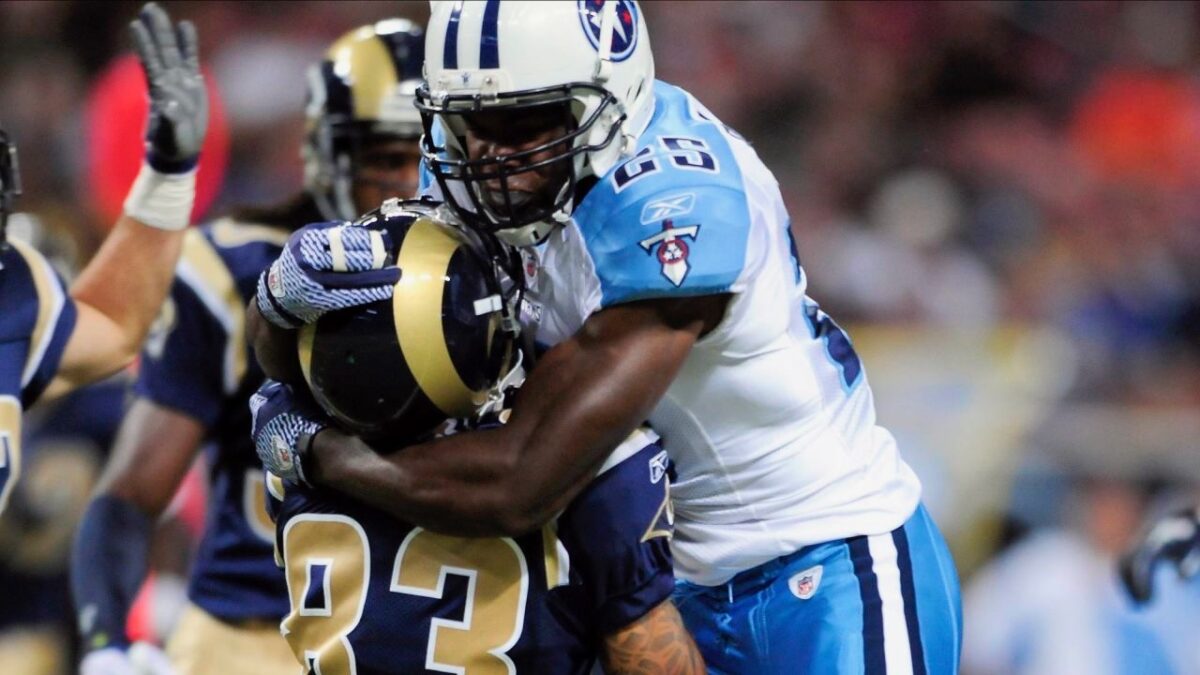
So I dropped from the first round to the sixth round when I came back from England. I made $50,000 instead of five, six, eight million. I only played three years in the NFL instead of ten years, which was projected. So I do feel that I was disappointed, and I was disappointing to some people who looked up to me.
I would call my parents, I would pray, I would talk to my pastors, go to Bible study. I would continue to read journals about neurosurgery and my future. I would continue to work hard on the football field and show my commitment by being there first and leaving last. That slow process of getting where I needed was a way to block out the background noise and suppress those frustrating thoughts and continue to move forward.
When I think about it, I do find the good in only having a short career because I didn’t leave with any concussions, any chronic traumatic encephalopathy—the CTE that’s really plaguing a lot of our players. My hands are good enough where I have the dexterity to live my second life, which is as a neurosurgeon.
I knew football had an expiration date. If I had my way, I wouldn’t have had it as early. But it worked out how it did. And it’s a blessing to be in this field now, waking up every day, doing surgery, helping patients in the hospital, teaching young medical students who come through Harvard and want to learn to be a neurosurgeon. It’s a really, really fascinating thing to do. And now being a global neurosurgeon, when I had a chance to go to Zambia and operate over there—I’ve been back home to the Bahamas. I’ve been operating in Montserrat, Antigua, Guyana, Jamaica as well. It’s really fun to now put all this work to use. It’s fantastic.
“I knew football had an expiration date. If I had my way, I wouldn’t have had it as early. But it worked out how it did, and it’s a blessing to be in this field now.” – Dr. Myron Rolle
You know, when you’re in science and when you’re in medicine, you don’t really speak too much about your relationship with Christ, like, outwardly with your patients or your colleagues in a hospital, because everything is supposed to be cerebral and neck up. But I know my faith informs the way I practice. It informs how I take care of patients, how I think about their cases. I pray before each case to make sure I’m doing the right things, to make sure that I am prepared as much as possible. And if there are things that limit my human ability, I will let God take over and have that intercession and come in and do what He does. That’s something that matters a lot to me and has been helpful throughout my career.
Narrator: To learn more about Dr. Myron Rolle, you can follow him on social media. Also, check out his book, The 2% Way, wherever books are sold.
Stay tuned to Inky Johnson’s story after a brief message.
When Life is Overwhelming, Jesus Listens
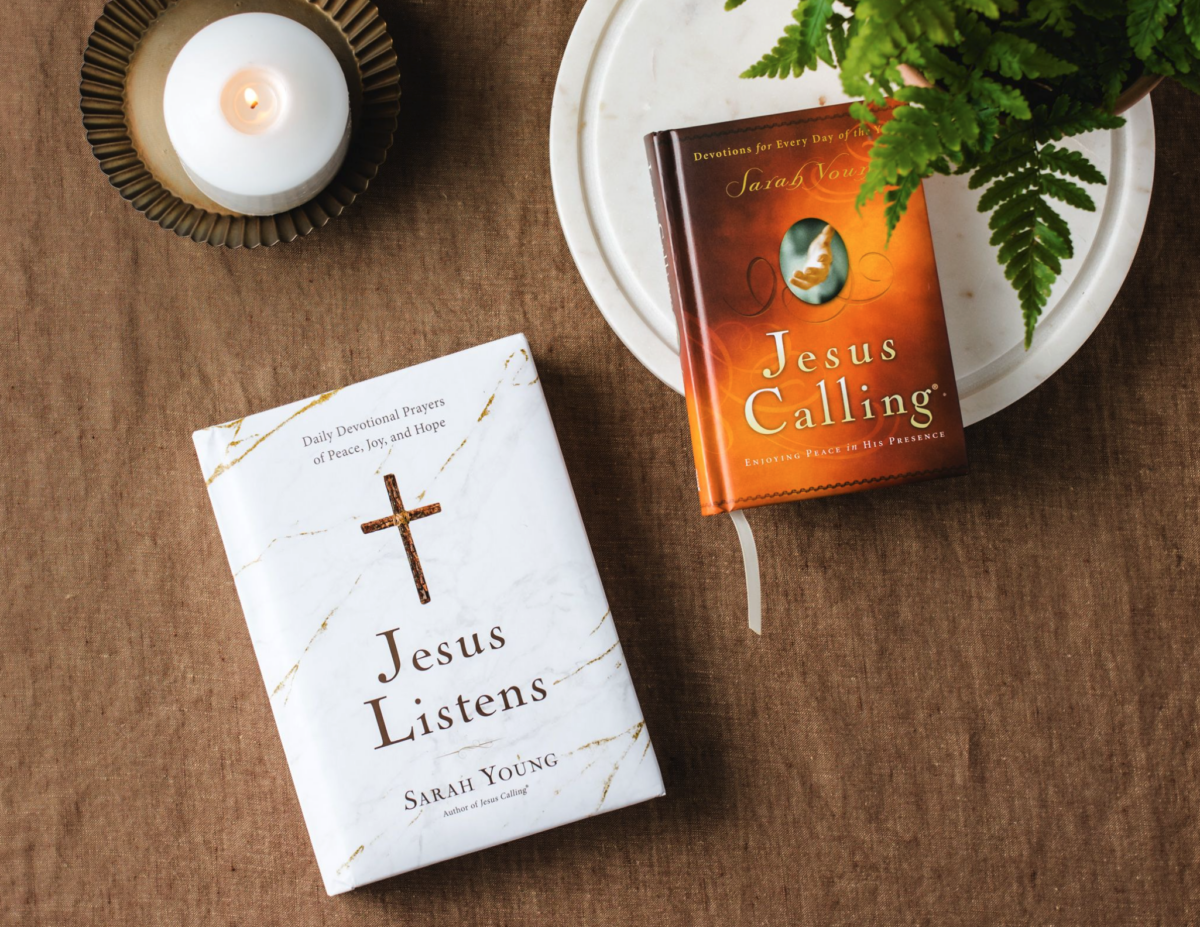
Sometimes life can be really stressful, whether it’s personal struggles or world issues that make us feel overwhelmed. But when we feel helpless, God is still there, ready for us to turn to him in prayer.
That’s why Sarah Young wrote Jesus Listens: to deliver a message of peace, love and hope to her readers every day. Jesus Listens is a 365-day prayer devotional with short, heartfelt prayers based on scripture, written to deepen your relationship with God.
Learn more about Jesus Listens and download a free sample.
Narrator: Our next guest is Inky Johnson. Inky was on track toward a great career in the NFL when he suffered a near-fatal injury his junior year at the University of Tennessee. After periods of doubt and uncertainty about who he was without football or what he would do now that his dream had been taken from him, Inky found that stepping into the dream God had for him post-football would bring him the same sense of satisfaction and achievement in what he knew was best and right for his life.
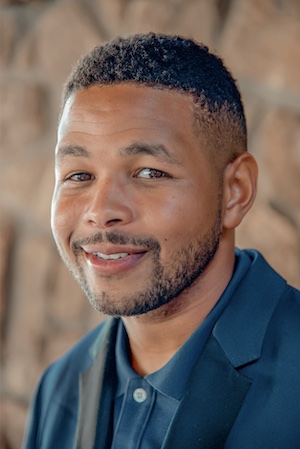
Inky Johnson: I’m Inquoris “Inky” Johnson. I’m a husband, father, big brother, son, friend, teammate. But the world knows me as an inspirational motivational speaker, former collegiate athlete. I’ve been traveling somewhere north of thirteen years on the road, trying to inspire and impact the world. But at my heart’s core, I’m just a servant, I’m a dad, I’m a husband, I’m a son, and I’m a big brother.
So my mom had me at sixteen, right in downtown Atlanta. She took me back to 125 Warren—that was our street address, and it was a two-bedroom home. There were fourteen of us living there in the southeast corner of Atlanta, and it’s a pretty tough neighborhood. We had everything under the sun, like a typical inner city.
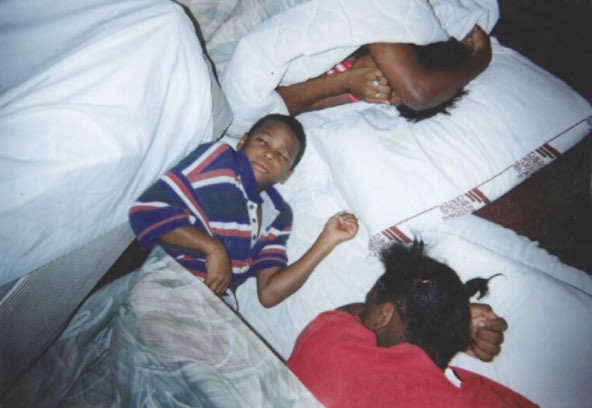
At an early age, I had this dream to make it to the NFL, because I was coming up in a two-bedroom with fourteen of us living there. And so me and my cousins, we slept on pallets, right? And I remember when we used to play football in the street, like, all the time. I’d get out of school, play tackle football in the street, and just get after it. And people saw pretty quick, like, “Man, that cat Ink, he got some talent.”
A Role-Model for Success in Difficult Circumstances
When I was coming up through the ranks of youth sports and playing football, I played at Fitzgerald Field in Tucker, Georgia, and they had a great program. I was playing park ball all the way up until high school.
Once I got to high school, I attended a high school by the name of Crim, and it was on my side of town. At the time, it was one of the lowest performing public schools in the state. Everybody knew I played ball and knew I had aspirations to go to college, and they would always say to my parents, like, “Hey, you need to transfer Inky from that school if you want him to get a shot at getting a scholarship.” Because at the time, the school—we weren’t doing well in sports, weren’t doing well academically, and people just weren’t going to college.
And so my mom talked to me and said, “Hey, Ink, this school said you can come and play ball for them, this school said you can come and play.”
And I was like, “No, I think I can make it from Crim High School.”
She was like, “Yeah, I hear you. But the chances of that happening with the current circumstances, I don’t know.”
And so people kept talking to her. I attended Crim my freshman and sophomore year, then my mom transferred me to another school—a great school with a football program, it was incredible. I got there, but I didn’t want to be there, right? Because I felt like I could make it back from where I was from. I was an Atlanta public school kid. I was at a school that was going against the odds. I just felt like I could make it, right? I felt like if I went to the other school and made it—you know, my cousins who lived in that same house with me, they wouldn’t have had the same opportunity. My friends, my peers, they wouldn’t have had the same opportunity. So it wouldn’t have meant as much.
And so when I got to this school—I’m not proud of it, but I really wasn’t going to class. I was just sitting there with the police officer, I would talk to some teachers, and they would say, “Hey, man, you’re extremely talented. Just come to class, and you can play ball, do your thing. You can get a scholarship one day.”
I was like, “Yeah, that’s cool, but I don’t want to be here.”
They’re like, “Yeah, but why?”
I was like, “I think I can make it back where I’m from.”
And so my mother just got tired of the back and forth, and she just transferred me back to Crim High School. And my senior year, I ended up getting a scholarship to the University of Tennessee.
When I got the scholarship, it was a big moment in my life because after I went to college, I had cousins coming behind me who went to college. I had friends coming behind me who went to college. That moment was important to me because I felt like if I could show my friends and my peers that we could make it to college from where we were from, I thought it would expand their vision and give them hope, belief, and faith that they could do it too.
A Life-Changing Injury
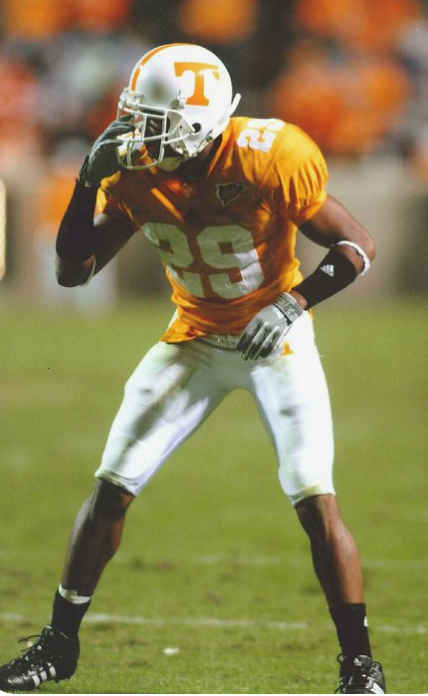
When I got to Tennessee, it was incredible. I had every resource on the face of the planet—it was a great program. I felt like with my upbringing, with the way I was raised, I felt like I had the character to be able to take advantage of that environment.
When I got there, I had two meetings. And in my first meeting, they said, “Inky, what do you want to accomplish academically?”
I said, “Hey, man, I want to graduate in three years.”
They said, “What do you want to accomplish football wise?”
I said, “I want to go to the NFL after three years.”
And after my third year, I was set up to do both. I ended up graduating after my third year.
But my junior year, the second game—September 9th, 2006—I went to make a routine tackle that ended my career and changed my life forever.
On that day, for some strange reason, when I went to make that tackle in the fourth quarter of the game, at the point of contact, something different happened that never happened to me before in my life. When I hit him, it seemed as if the breath in my body left. I fell to the ground. I blacked out. I was like, I can’t move. It was like a shot going from the crown of my head to the bottom of my feet. And it eventually left mostly, but it stayed on my right arm and hand.
[The trainer] put me on a spine board, wheeled me off the field, and got me to the hospital. And he said, “We’re going to take you back, run some tests.” And my mother comes in, and she kissed me on my forehead and says, “You’ll be fine, it’s football.”
“My junior year, the second game—September 9th, 2006—I went to make a routine tackle that ended my career and changed my life forever. ” – Inquoris “Inky” Johnson
And when she exits the room, the head doctor comes running in, he’s screaming and he’s saying, “Guys, get in here. We got to rush this kid back to emergency surgery. He’s about to die.”
And I was like, “Man, what happened?”
He’s like, “We ran a test. We noticed that you’ve ruptured your subclavian artery in your chest, you’re bleeding internally. So we have to rush you back and take the main vein out of your left leg and plug it into your chest in order to save your life. Or I guarantee you won’t be alive in the morning.”
I said, “Let’s go.”
And the next morning I woke up, and I had six incisions down my left thigh. I had one incision across the left side of my neck. They had bandaged me from the neck to my knees, 350 staples in my body. They said, “When you went in to make the tackle, you ruptured the artery, and when we went in to perform surgery on the artery, we noticed you had torn the nerves in your brachial plexus.”
I was like, “What’s that?”
They said, “It’s the nerve roots that go from your spine, it controls your shoulder, arm, hand, fingers. Once you rupture them, they can’t go back in. So unfortunately, Inky, your arm, your hand, your shoulder, it’ll probably never be the same again. So your football career is probably done.”
I couldn’t believe it. I literally couldn’t believe it. I thought it was surreal. I thought I was in a bad dream. I didn’t think my career would not only end that day. I didn’t think I would be left with a paralyzed right arm and hand from that day moving forward.
“I thought I was in a bad dream. I didn’t think my career would not only end that day. I didn’t think I would be left with a paralyzed right arm and hand from that day moving forward.” – Inquoris “Inky” Johnson
Preparing for Life Beyond Football
You know, it’s interesting. I was raised in a church by my mother and my grandmother. We grew up in a household where I always tell people, “I got to see both sides of the fence. I got to see crime on one side. On the opposite side, I got to see a grandmother and a mother who were diligent and went to church every Sunday. They’d try to be in church every Wednesday, and I got to see the results of that.”
But just like any other kid, you know, you go to church, you go to Bible study, and you kind of just make your way through. And when I got to Tennessee my freshman year, I got locked in with the chaplain, a guy by the name of James Mitchell, and he’s the chaplain for the Tennessee Titans NFL team now. He was our team chaplain at the time. He came to me my freshman year, and I was talking trash after scrimmage, you know, joking. And he said to me, “I want to disciple you.”
And I remember saying to him, like, “Man, what’s that? That sounds hard.”
And he’s like, “I want to disciple you spiritually. I want to help you grow. The same way you study football, study your playbook, you do different things, I want to walk with you through discipleship and help you grow in your relationship with Christ. I want to give you assignments. I want to help you.”
I was like, “All right, cool. Would you mind if I go back to some of my roommates so I can have a level of accountability?” And we went through this discipleship with James Mitchell. And spiritually, it changed our life.
And so I tell people, my third year when my injury happened, it was weird right? In the moment, I couldn’t understand it. It didn’t feel good. But once I got months out, years out—maybe two and a half to three years out—I was able to gain some level of peace about what had transpired. But also, I was able to look back and see that God had prepared me all along. I had been in discipleship spiritually for three years, and so my perspective was already changing. My language was already changing. My relationship with Christ was already changing. And so when I sustained the injury, my perspective, my spirit, my peace were already in a different space and place. But not only mine: my roommates, my teammates, they helped me more than anything. My mother, my father, they helped me more than anything.
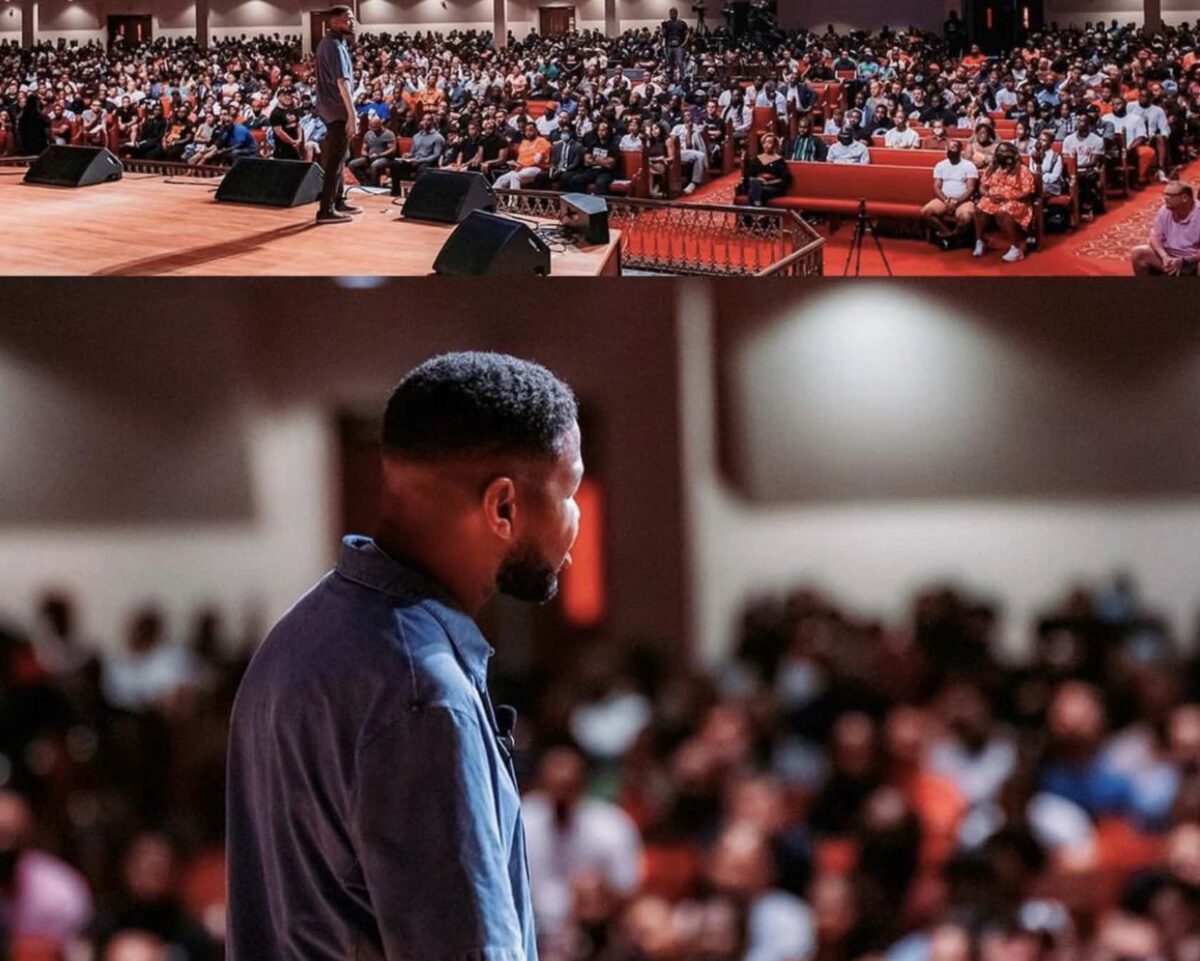
So I would say when I look back on it, God was preparing me all along before this injury ever happened. It was just in the moment, I couldn’t see it. There’s a quote that says, “Sometimes we can’t see the picture when we’re in the frame.” When the injury first happened, I was in the frame for two and a half to three years out. I was able to step back and look at it with a big picture perspective and see how God was guiding me all along.
“When I look back on it, God was preparing me all along before this injury ever happened.” – Inquoris “Inky” Johnson
I remember when I was a kid and I would see somebody, whether they were working in a profession or whether they were doing something as an athlete or whatever the case may be, I would always think, Hey, man, they had to always want to do that, right? Like, you would meet them at whatever phase they were in in life, and they had to always want to do that. And I think one of the common mistakes we make as people is thinking where we meet people is where they’ve always been. And that’s just not true. And so we all encounter serendipity moments in life, right? Things happen that we don’t expect and send us down a certain journey in life, so that when people meet us and they ask, “Hey, man, how did you start doing this?” Right?
“I think one of the common mistakes we make as people is thinking where we meet people is where they’ve always been. And that’s just not true.” – Inquoris “Inky” Johnson
And so when my injury happened and one thing led to another, it was a serendipity journey. So to sit back and think about life and how we arrive at the destinations where people see us, a lot of it happened by happenstance, through adversity, through opposition. Some of the greatest forms of growth happen in uncertain moments.
“Some of the greatest forms of growth happen in uncertain moments.” – Inquoris “Inky” Johnson
Surviving Adversity to See Where God is Working
I journal for my meditation and devotion period every single day. And one of the reasons I journal—I journal to my children, both of them. I have a ten-year-old son Junior—his real name is Inquoris. I have an eleven-year-old daughter, Jada, and I journal to my wife and I journal to myself. And one of the reasons I do that is because when my kids get to a certain age, I don’t even know when I’m going to give them to them. I just journal and write in them. But when they get to a certain age, God forbid, if something happens to me and people come up to them and say, “Hey, man, let me tell you about your father, right?” And that’ll be cool. They’ll listen. But I want them to have something they can often refer to, almost like a guide as they go throughout life to where I write about decisions and choices, why I do things the way I do, our family’s principles, values, what we stand on, what we live by. You know, why I did certain things with them that they may have not understood at the time.
When I write to my wife, I share certain things. When I write to myself, I share certain things from where there’s challenges, whether it’s fears, risks, uncertainties, and very transparent. I do it around lunchtime. And at night sometimes when I put my family down, I journal. And that serves as my reset, you know, every single day that brings perspective, puts things into perspective, and that puts on my armor and it gets my day started.
This is a passage from Jesus Listens, March 23rd:
Victorious Lord Jesus,
Help me to rejoice in my sufferings—really believing that suffering produces perseverance, perseverance produces character, and character produces hope. It’s so encouraging to know that pain and problems can actually be blessings—increasing my hope. I realize, though, that this doesn’t happen automatically. I need to cooperate with Your Spirit as He guides me through times of suffering.
The more I become like You, the more hope I experience. These changes in my character convince me that I really do belong to You! My closeness to You also helps me cope with problems—trusting that You and I together can handle them. And the radiant hope of heaven shines upon me, strengthening and encouraging me.
In Your glorious Name, Amen
When we go through things in life, I think the natural reaction—and it’s okay to think this way or respond this way—I think the natural reaction is we want to understand it when we encounter adversity, opposition, things outside of our control. Especially as believers, we want to understand it. Like, “Hey, God, what’s up, man? What’s this? Why am I going through this? Why am I encountering this?” Like, we want to understand it. And I often tell people, even when I first started speaking, I was like, “Hey, when you go through something that doesn’t feel good, that you can’t understand, that you can’t pull the grips on, don’t try to understand it. Just survive it, right?” Survive the moment. Survive the adversity. Survive the opposition. Survive the challenge, right? Survive the rough patch. Survive the uncertainty. And then when you get to a place of peace, you go back, you connect the dots, and you see where God was working all along.
Narrator: To learn more about Inky Johnson, you can find him on social media. You can also find his podcast and speaking schedule at www.inkyjohnson.com.
If you’d like to hear more stories about when God changes our direction, check out our interview with Jason Brown.
Next Week: Jodi Benson
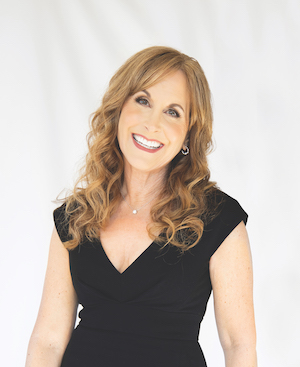
Next time on the Jesus Calling Podcast, we hear from the iconic, original voice of Ariel in Disney’s The Little Mermaid, Jodi Benson. Throughout her career, Jodi had to make big leaps of faith that were out of her comfort zone, but she trusted that God would lead her exactly where she needed to be.
Jodi Benson: It just so happened that God’s perfect plan was for me to become Ariel. And I learned and made a ton of mistakes along the way. But as I look back on this journey of thirty-five plus years now, it is truly a ministry. And it’s such an honor and such a blessing to have the opportunity to be the voice of Ariel, but also to just come in contact with so many amazing fans around the world.
